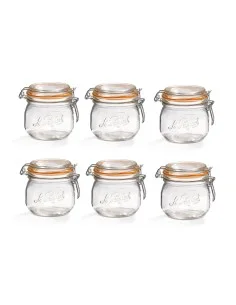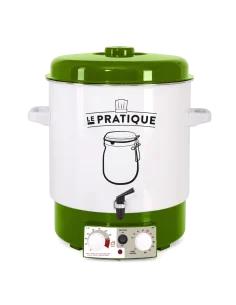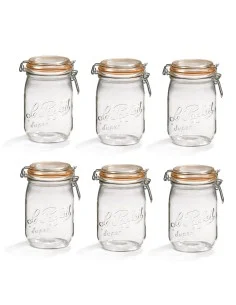- Stérilisation des aliments
- 2 likes
- 1696 views
- 0 comments

What is sterilization?
To be able to understand the benefits of sterilization, one must already understand what it is. Sterilization or appertisation (named after its inventor Nicolas Appert) was first discovered in 1795. The technique has been mastered for a long time!
The principle of sterilization is to bring a preparation to a high temperature in order to kill any microorganisms and to expel the air from the jars to make them sterile to any external contamination. This method therefore allows food and culinary preparations to be preserved for a very long time, which can last up to 5 years!
Have you ever wondered how the jars and cans found in supermarkets can keep for so long? Well, it's because manufacturers apply this sterilization technique that this is possible.
The advantages of making your own jars
For the pleasure of cooking and the pleasure of giving! Making jars for yourself, but also for others, here is a great way to share your culinary preparations. Accompanied by a pretty label, the jars will delight those who receive them. It is also an opportunity to share a moment with the rest of the family, keep the little ones busy, pass on know-how and a taste for good things.
This allows you to eat in season all year round of course! Eating these lovingly prepared meals all year round, who has never dreamed of it? A homemade tomato sauce in March, a ratatouille in the middle of winter, wild garlic all year round ... Everything becomes possible with sterilization! Just stock up on seasonal vegetables when the time comes and organize your stock of jars.
Home preserving saves time on a daily basis. Indeed, preparing 10 jars of tomato sauce does not take much more time than making a single jar. Many people consume a serving of tomato sauce a week but lack the time to make it at home. To avoid spending 1 hour every week in the kitchen, just take 2 hours on a Sunday to make a single large preparation that will simmer quietly and then be sterilized in several jars. So portions of homemade tomato sauce will be ready anytime, perfect for when the weather is short or for those lazy nights.
For people who like to prepare large casseroles, it is interesting to sterilize a portion in a jar to avoid food waste. Especially when you are alone or with a small household, and do not want to eat the same thing 5 days in a row. Likewise, slightly damaged vegetables can be cooked and then sterilized to avoid losses. For a ratatouille or a good homemade soup, for example.
Another advantage with home preserves is being able to control what we put on our plates for a healthy and balanced diet. Seasonal and local products, but also quality products in good quantity! With sterilization, there is no need to have preservatives in your prepared meals, which is good news for our health. Home preserves are usually made in glass jars which is also a health benefit. In fact, glass does not release any component, unlike metal containers such as a tin can.
In addition to being good for your health, making your own jars is good for the planet. Storage is at room temperature and does not require any energy, unlike freezing, for example. The glass container is durable as it can be reused without limit in our kitchens. And when it comes to cracked or chipped jars, they can be recycled very well: they can be melted endlessly without losing quality!
Finally, a very good reason to start sterilization is the economic aspect! Anyone who has already done the math is convinced that making homemade jars remains financially advantageous. The example of the homemade tomato sauce is proof of this: a crate of tomatoes "for sauce" at the local market is sold at a very attractive price. And by going to the end of the market, there are all the unsold items that risk being lost and the prices drop drastically. Obviously this is not a hard and fast rule, but overall, we got it!









Comments (0)